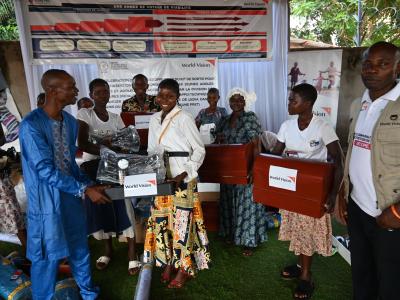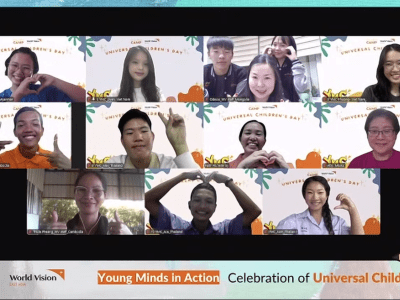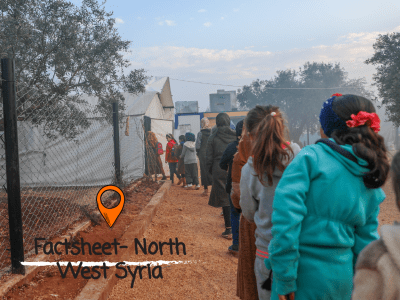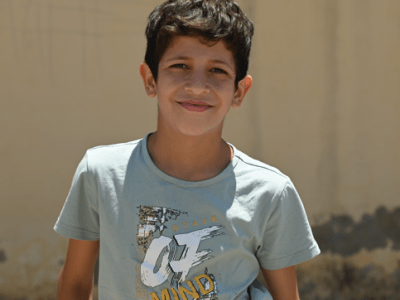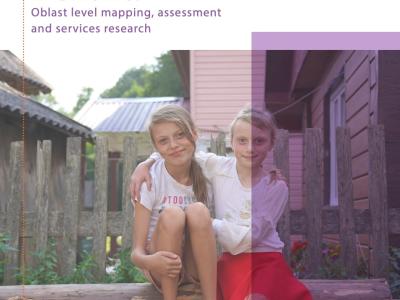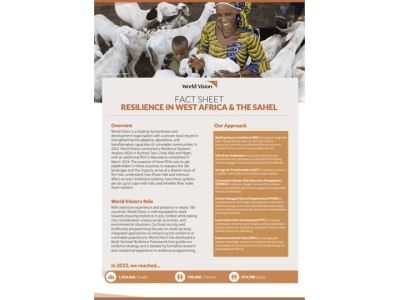article / Noviembre 26, 2024
A second chance at education: how school feeding changed Aschila’s life
Aschila’s life turned positive when World Vision Ethiopia introduced a school feeding programme through the Education Cannot Wait (ECW) project.
video / Noviembre 28, 2024
Championing Inclusive and Quality Education for Every Child in Zambia
Every child in Zambia deserves inclusive, relevant, and quality education. On World Children's Day 2024, World Vision Zambia reaffirms its commitment to creating an environment where every child can realize their right to learn and thrive.
article / Noviembre 13, 2024
DR Congo: 88 Young People Ready To Launch Income-Generating Activities After Training In Various Vocational Skills By World Vision
This article highlights the Youth Ready approach in the DRC, empowering vulnerable youth to transform their lives and launch income-generating activities.
press release / Noviembre 25, 2024
New child and youth-led climate research reveals the urgent need to strengthen climate education and disaster mitigation across Asia
World Vision East Asia’s first child-led research on climate action and disaster mitigation reveals that underpinned by the low to moderate levels of disaster preparedness in vulnerable communities, there is a pressing need to strengthen climate education (formal and informal) and disaster mitigation through school programmes and social media channels.
article / Noviembre 25, 2024
Building Resilience Through Cash Transfers in Mozambique
Joana, a 60-year-old woman from Northern Mozambique, transformed her life and those of her four nephews and nieces by starting a food and drink business with the help of a cash transfer programme funded by the Austrian Development Agency, highlighting the profound impact of community support and resilience.
publication / Octubre 28, 2024
FACT SHEET: WORLD VISION SYRIA RESPONSE (WVSR) NORTHWEST SYRIA
The population in Northwest Syria is 5.1 million, 4.2 million of which are in need of assistance. Among them, 3.6 million are food-insecure, 3.4 million are internally displaced, and 2 million are living in camps. From 2014 to 2023, the cross-border aid delivery mechanism from Türkiye has served as a critical lifeline to people in Northwest Syria. Based on the consent letter dated 13 July 2023, the Government of Syria granted the UN permission to use the Bab al-Hawa border crossing for humanitarian aid delivery into Northwest Syria. This arrangement eliminated the need for a UN Security Council resolution and, since then, the consent letter to deliver aid has been renewed every six months.
A recent Protection Cluster assessment of 259 communities in Northwest Syria revealed limited access to protection services and aid, with 55% of communities reporting no assistance. Another recent assessment conducted by the Education Cluster showed that 54% of schools in the region were affected, with approximately 1,000 schools partially damaged. This has led to an increase in out-of-school children, rising from an estimated 800,000 to 1 million.
The ongoing conflict in the area had already compromised sewage networks due to airstrikes, ground battles, and inadequate infrastructure management. These factors resulted in the destruction of wastewater pipelines, rendering substantial portions of the sewage system inoperable. The earthquake also caused significant damage to vital WASH facilities, including the collapse of water reservoirs, towers, stations, and sanitation systems. A REACH assessment indicated that at least 25% of WASH services in Northwest Syria were damaged.
This exposure to untreated sewage has contributed to the spread of waterborne diseases, including cholera, typhoid, and gastroenteritis; this posed a significant threat to local water sources and public health. The existing WASH infrastructures, already fragile and inadequate, have been further strained by limited funding.
publication / Noviembre 26, 2024
Middle East Crisis (MEC) Response |LEBANON SITREP #7
In the last ten days, the conflict in Lebanon has seen intensified attacks across the country. On World Children’s Day, Lebanon mourned the tragic killing of 200 children since the escalation, underscoring the profound human cost of this crisis.
Negotiations have resumed in an effort to reach a ceasefire. At the moment, no agreement has been confirmed, and hostilities continue unabated. Amid these negotiations, heavy bombings have escalated to unprecedented levels. Recent airstrikes targeted highly populated neighbourhoods without prior evacuation orders in central Beirut—Basta, Mar Elias, and Zokak el-Blat—areas sheltering internally displaced families. These strikes killed 48 people, injured over 150, and displaced hundreds of families for a second time.
In southern Lebanon, entire villages have been destroyed, leaving critical infrastructure—water, sanitation, and electricity systems—completely inoperable. Heavy bombings in Tyre, Baalbek, Hermel and Beirut’s suburbs have further deepened the destruction. Economic and physical damages are now estimated at $8.5 billion, and even with a ceasefire, it will take at least a year of repairs before families can return home. Over 170,000 people face imminent job losses due to the destruction of infrastructure and livelihoods.
According to Lebanon’s Ministry of Public Health, as of 24 November, 3,754 people have been killed, including at least 230 children, and more than 15,626 have been injured.
publication / Septiembre 24, 2024
Public protection system in Ukraine: Oblast level mapping, assessment and services research
This study “Public protection system in Ukraine: Oblast level mapping, assessment and services research” is made possible by the generous support of the American people through the United States Agency for International Development (USAID) under Grant Agreement: Providing multi-sectoral humanitarian assistance to conflict-affected populations in Ukraine (2023-2024)” lead by Acted.
publication / Noviembre 26, 2024
Fact Sheet: Resilience in West Africa & The Sahel
World Vision's food security and livelihoods programming focuses on multi-sectoral, integrated approaches to enhancing the resilience of vulnerable populations. This fact sheet spotlights our work in five countries across West Africa and The Sahel.

